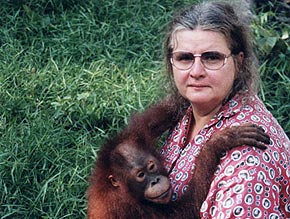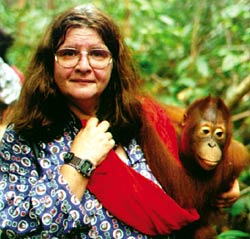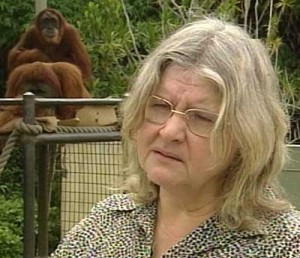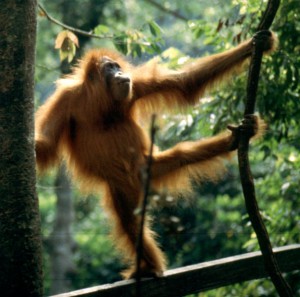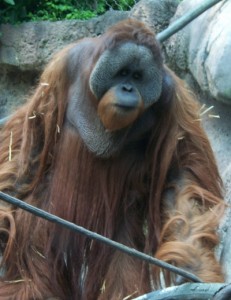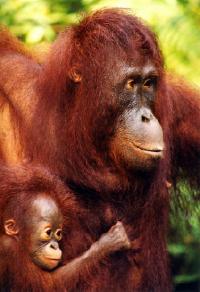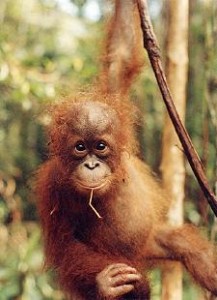Dr. Biruté M.F. Galdikas, OC, is a primatologist, conservationist, and ethologist recognized as the world’s leading authority on the endangered orangutans of SE Asia. Biruté Galdikas was born in 1946 in Germany to Lithuanian parents and grew up in Toronto. She studied first at UBC then in California, graduating with a PhD in Anthropology from UCLA in 1978. As a graduate student she met the eminent paleoanthropologist Louis Leakey, who believed that studying the great apes in their natural habitat would offer insights into human evolution. She persuaded him she was the person to study the comparatively little known orangutan. Thus, with Jane Goodall (chimpanzees) and the late Dian Fossey (mountain gorillas), Galdikas became one of the three women now known as “Leakey’s Angels,” world renowned for their studies of primates most closely related to humans. Galdikas began her orangutan studies in 1971 in Tanjung Puting, Indonesian Borneo. In October 1975 her work was first widely recognized when she appeared on the cover of National Geographic. In 1986 she co-founded Orangutan Foundation International, a nonprofit organization dedicated to the conservation of wild orangutans and their rainforest habitat in Indonesia and Malaysia. In 1998 she set up the Orangutan Care Centre and Quarantine in Kalimantan Tengah, Indonesian Borneo. This is now home to about 200 injured or diseased orangutans, who are cared for until they are well enough to be released back into the wild. After 37 years in Tanjung Puting, now a national park, Galdikas has conducted the longest continuous study by one principal investigator of any wild mammal in the world. Her husband, Pak Bohap, a Dayak rice farmer, is a tribal president and co-director of the orangutan program in Borneo. Galdikas‘s articles have appeared in National Geographic, Science, and many other distinguished journals. Her books include her memoir Reflections of Eden: My Years with the Orangutans of Borneo (1995), Orangutan Odyssey (1999), and Great Ape Odyssey (2005). She is a coeditor of African Apes (All Apes Great and Small, Volume 1) (2001) with Jane Goodall and others. In June 1997, Galdikas won the prestigious Kalpataru award, the highest honour given by Indonesia for outstanding environmental leadership. She is the only person of non-Indonesian birth so to be recognized. Her other awards include a Guggenheim Fellowship (1983), a PETA Humanitarian Award (1990), the Eddie Bauer Hero of the Earth Award (1991), the Sierra Club Chico Mendes Award (1992), and a United Nations Global 500 Award (1993). She was co-winner of the 1997 the Tyler Prize for Environmental Achievement. In 1995 she was made an officer of the Order of Canada. Dr. Galdikas is Professor of Archeology at Simon Fraser University and “Professor Extraordinaire” at the National University in Jakarta, Indonesia. Much of her time is currently spent on a campaign to save orangutans and their habitat from destructive human incursions. Orangutans (with thanks to Wikipedia) Orangutans are known their intelligence, long arms, and reddish-brown hair. The only surviving example of the genus Pongo, they are currently found only in rainforests on the islands of Borneo and Sumatra. The word “orangutan” derives from the Malay phrase orang hutan, meaning “person of the forest.” Orangutans are the most arboreal of the great apes. Every night they fashion sleeping nests from branches and foliage. They are more solitary than the other apes, males and females generally coming together only to mate. Mothers stay with their babies until the offspring reach an age of six or seven years. Females can grow to around 127 centimetres and weigh around 45 kg, while males can reach 175 centimetres and weigh over 118 kg. Fully mature males are distinguished by their prominent cheek flanges. Orangutans are remarkably intelligent. In the 1990s one population was found to use feeding tools regularly. In 2003 the journal Science described the evidence for distinct orangutan cultures. According to one recent researcher, orangutans are the world’s most intelligent animal after humans, with higher learning and problem solving ability than chimpanzees. A study by a primatologist at Duke University found them capable of tasks well beyond chimpanzees’ abilities — such as using leaves to make rain hats and leakproof roofs over their sleeping nests. In some food-rich areas, they have developed a complex culture in which adults teach youngsters how to make tools and find food. Although orangutans are generally passive, aggression toward other orangutans is very common; they are solitary animals and can be fiercely territorial. Immature males will try to mate with any female, and may succeed in forcibly copulating with her if she is also immature and not strong enough to fend him off. Mature females easily fend off immature suitors, preferring to mate with a mature male. Orangutans have even shown laughter-like vocalizations in response to physical contact, such as wrestling, play chasing, or tickling. Bornean orangutans (about 55,000 remain) are highly endangered and Sumatran orangutans (about 7,000 remain) are critically endangered. The destruction of orangutan habitat by logging, mining and forest fires has been increasing rapidly in the last decade. Moreover, vast areas of tropical forest have been converted to plantations for the production of palm oil. Indonesia currently has the fastest rate of deforestation in the world. Some scientists believe that these plantations could lead to the extinction of the species in the very near future. Much of this activity is illegal, occurring in national parks that are officially off limits to loggers, miners and plantation development. Baby orangutans are also poached for sale into the pet trade; the trappers usually kill the mother to steal the baby.
Pongo in Peril was last modified: January 21st, 2017 by
Categories:

